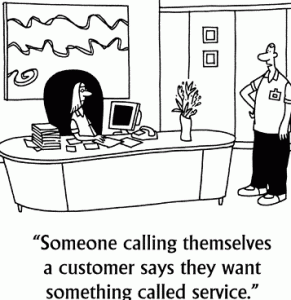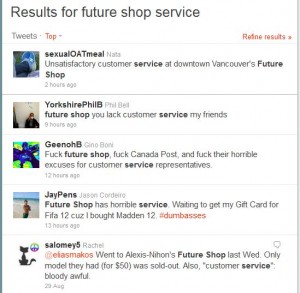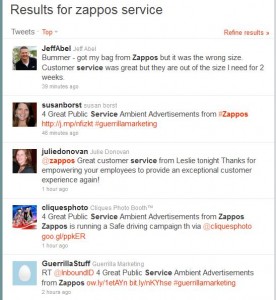Hardly a week goes by without seeing an article or opinion piece about how important it is to ‘delight customers’. And companies like Disney, Apple, Southwest Airlines and Zappos are regularly held up as shining examples of companies that succeed in this area.
 But what do people really mean when they say that companies should “delight customers”?
But what do people really mean when they say that companies should “delight customers”?
Delight is not easily quantified, although you know it when you see it or experience it. But if you want to delight customers, the good news is that the bar set by most companies is really low. Look at virtually any telco or mobile provider, or many retail outlets to see exactly now not to delight customers.
The following are 5 rules to follow to delight customers, regardless of the industry your are in.
Make the Mundane Memorable
Let’s face it, most of the interactions we have with companies are forgettable. They are simple actions or transactions that we have everyday with virtually every vendor. And that fact means there is opportunity to separate from the crowd.
I’ve written about Disney previously. We visited Disneyland after visiting SeaWorld and the San Diego Zoo. And while there were many memorable aspects to the visit, one thing that I noticed right away was how effortless the parking was at Disneyland, particularly compared to virtually everywhere else we had gone. I wrote:
First of all, strange as it sounds, I can’t sing enough praises about the parking garage at Disneyland. Yes, you read that right. Disney has made even the mundane task of parking, ruthlessly efficient. Disney staff direct incoming vehicles into successive rows of empty parking spots. Contrast this to other parks, where, like in a shopping mall, you hunt up and down rows for an open spot.
Another example is Southwest Airlines. You may have already seen the video, but if not spend a couple of minutes and listen. And note the passengers’ faces and reaction at the end. Do you think they’ll remember their flight on Southwest and tell others about it?
In both these examples, it doesn’t cost the companies any extra money to do these things, but the impact on customers is clear, the fact that they thought of these little details says to me that they will definitely care about the big things.
Don’t Be a Hypocrite
In the age of social media, the term “authenticity” is used quite often. In fact, search on Google for the words social media authenticity and you get over 5,000,000 hits!
Being “authentic” means being honest with your customers in all aspects of your interactions with them. In my view, the opposite of authenticity is hypocrisy. i.e. saying one thing and doing another.
One of the worst examples of hypocrisy occurs with call centers. I’ve had this happen many times, perhaps you have too.
When putting me on hold in long queues to speak to “the next available attendant”, a recorded voice comes on regularly telling me “your call is important to us”. Really??? How important could it be? You’ve had me on hold for over an hour. If it was really important, you’d have enough staff so I wouldn’t have to wait an hour to speak to someone and once I do get through it wouldn’t be a poorly trained, unempowered person on the other side of the world who pretends he’s in a call center in Des Moines Iowa.
I could cite other examples like this, such as meaningless guarantees or refund policies, but overall, treat people with honesty and decency and help them get their problems resolved. That’s all that anyone really wants.
Customer Service, not Lip Service
Zappos is famous for their customer service. In fact, excelling at customer service is a fundamental part of their business strategy. They sell what are essentially commodity items — shoes, purses, clothing, jewelry etc. And so they’ve decided to differentiate themselves on their service e.g. free delivery and free returns. But Zappos goes well beyond these simple tactics and takes it’s dedication to service to it’s employees. There are lots of articles that detail Zappos’ culture etc. but one test Zappos has to see how dedicated their new employees are is known as “The Offer”.
Zappos offers all new employees who have finished their mandatory training $2,000 if they’ll quit. i.e. If you don’t think you want to stay at Zappos, here’s an incentive to help you make your decision. A small percentage take the offer, but the vast majority stay. By identifying those people who are less committed to the objectives of the company and accelerating their departure, Zappos ensures that those who stay are truly the ones who will help the company succeed. Simple but incredibly effective.
On the flip side, I wrote about a particularly bad customer service experience at a Canadian retailer — Future Shop — here. To make a long story short, all I wanted to do was exchange a defective clothes washer that had been delivered to me. I spoke to about a dozen “customer service” people who consistently failed at their job. During the ordeal, which eventually did get resolved, I came to the following conclusions about Future Shop staff.
- They openly and consistently lie to customers
- They don’t know what the word “Service” means
- They are trained to show empathy over the phone but have a complete disregard for customer issues
- Beyond empathy training, they are not trained to read notes in a file and have no understanding of internal FutureShop processes
Comments on the blog from readers indicated I was not alone in my experience. Will I buy anything from Future Shop again? Unlikely.
And just to reinforce these points, I did 2 Twitter searches as I was writing the post. One for the words future shop service, and one for zappos service. These are the most recent 5 Tweets each, completely unedited. Click on each to enlarge and read. Case closed.
Kill the lawyers fine print
I don’t know about you, but I hate fine print. Yes, we live in a litigious society, but the only thing worse than letting accountants run a company is letting lawyers run it. But all fine print doesn’t come from lawyers. A lot of it comes from Marketing people or Product Managers.
Here’s a simple example. I got a coupon for a “Buy 1 get 1 free” admission to a movie at my local movie theater. There was a lot of fine print on the back, and I hate to admit, that my eyes have reached a point where I can’t read it without my reading glasses so I didn’t read through it. But, I decided to take 2 of my kids to see Spy Kids one weekend.
We got to the theater, only to find out that the coupon wasn’t valid on Fridays or Saturdays. Darn. Should have read the fine print. OK, I said to my kids, let’s come back tomorrow, no harm. We returned on Sunday to buy our tickets – 1 adult, 2 children.
The theater employee informed me that the coupon was only good for “1 free General Admission ticket with the purchase of 1 other General Admission ticket.” You see, “General Admission” specifically means “Adult” ticket. i.e. she was saying I had to pay for an adult ticket for my child if I wanted to use the coupon. We argued a bit and worked it out, but my question is why? Why would that be a stipulation? Why does it matter that the ticket be an adult ticket? And then to use terminology like “General Admission” that is clearly misleading.
Needless to say, even though it was a small extra amount, I wasn’t too happy about the hassle of using a simple coupon at the movie theater. A pox on you and your lawyers Cineplex Odeon.
Kill the fine print, put the lawyers in the back office where they belong and make it easy for your customers to actually purchase and enjoy your product or service.
Don’t let bad judgement multiply
No matter what business you are in, problems occur that need to be addressed. And if the problem is the fault of some of your employees, don’t compound their bad judgement with more bad judgement from those whose job is to rectify the situation. It can come back to haunt you in ways you never expected.
You’ve probably heard of the “United Breaks Guitars” incident. In short, a musician (Dave Carroll) checked his guitar as luggage on a United flight. He claims he (and other passengers) saw it being mishandled and dropped by baggage loaders. He alerted staff on the plane who ignored his words. When he picked up his guitar at his final destination, it was broken. United Airlines stonewalled him for months and offered no settlement. Then Dave, being the musician that he was, put out his story to the public via the following YouTube video. 10 Million views and counting!
It was a PR disaster for United to say the least. How simple would it have been for the flight attendants to listen to the passenger, or for United to compensate the passenger for his loss.
Now, some people might say, well, that would only encourage others to make false claims for damaged luggage and where would that leave United? But the fact is that the vast, vast, vast majority of people have no intention or reason to do even attempt this. Don’t create policies and rule based on exceptions and apply them to everyone. It not only penalizes all of your honest customers, but it creates a clear culture amongst your employees on how the company views customers.
In summary
None of these suggestions are new or revolutionary. But the companies that excel and are renowned for their customer service take simple rules like these and put them into practice. They instill them into their culture so that their employees know that this is the norm expected of their behaviour.
What’s surprising is that none of these really cost a lot of money to implement. OK, free shipping and returns a la Zappos does cost real money — but having dedicated service employees who are empowered to resolve customer issues doesn’t.
The question is why aren’t more companies doing these things?
Saeed
Tweet this: 5 ways to truly “delight customers’ http://wp.me/pXBON-2RU #prodmgmt #leadership #custserv

